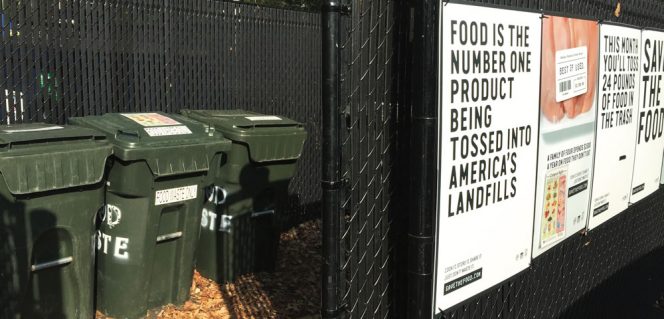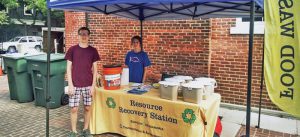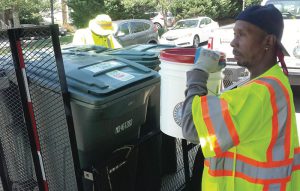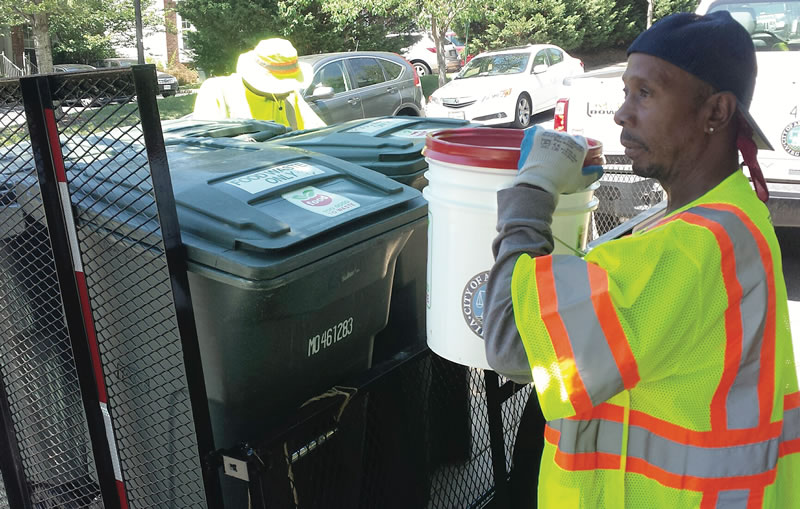Two northern Virginia municipalities evaluate options to divert residential food scraps — from 24/7 drop-off to curbside collection.
Marsha Johnston
BioCycle January 2017

The City of Falls Church (VA) established a 24/7 household food waste drop-off site last August, which is located behind City Hall.
Photo courtesy of City of Falls Church
Falls Church, which calls itself “The Little City,” has an estimated population of 13,892. For the first nine months of its food waste diversion pilot that started on August 1, 2015, the city provided 65-gallon roll-off bins and a staff member at its Saturday farmers market, where residents could deposit their organics for free. There were approximately 100 drop-offs every Saturday. During the week, the bins were stowed with other trash dumpsters behind City Hall.
During the pilot, residents kept telling the city staffer at the farmers market that they definitely wanted to keep diverting food scraps, but that they would really like to be able to so on their own schedule. By the end of the city’s fiscal year on June 30, the solid waste department realized it could incorporate a 24/7 food waste drop-off area into an already existing plan to redo the dumpster enclosure behind City Hall. “The cost to experiment was negligible,” McGough explains, adding that if the 24/7 drop-off becomes problematic, the food bins can be replaced with a traditional dumpster. Food scraps accepted at the drop-off site include all food scraps except meat and dairy, flowers, paper towels and napkins (kitchen only), uncoated paper bags and plates (food-soiled is okay) and tea bags and loose tea.
The increase in volume indicates that the 24/7 drop-off program should be a success. While Falls Church doesn’t have enough budget to initiate curbside organics collection, it has ensured the continuation of the permanent drop-off site by shifting funds from less popular solid waste programs. To select a longer-term vendor for the operational phase of the food scraps drop-off program, the city issued a bid in November. The city was seeking a vendor that could provide variable volume pricing options, as well as more hard data on volumes diverted. “Currently we are paying for a fixed number of bins,” says McGough. “That worked well when it was just from the farmers market, but now we have more variation in volume, and needed per-container pricing so that we don’t have to pay for a bin that is half full.”
So far, contamination has not been a significant problem. McGough personally checks the bins, as the drop-off site is near his office. “Passionate participants” also alert his staff to problems, as does the city’s contractor, Veteran Compost. “I have found plastic bags in the compost just twice in three months,” he notes. “Who knows, the low contamination rates could be the result of participants getting coaching for the past year from Farmers Market staff — but it is definitely encouraging! We hope the trend continues as participation increases.”

The City of Alexandria (VA) offers residential food scraps drop-off at its five farmers markets.
Photo courtesy of City of Alexandria
Sticking With Drop-Off
The City of Alexandria, Virginia has tested a range of food waste collection programs, including farmers market drop-offs for household food waste diversion, a year-long apartment building pilot and school program and, most recently, a 3-month curbside collection pilot. In the end, the City of Alexandria has decided to stay with its 3-year old farmers market program. “Expense was not the deterrent to expanding the curbside collection pilot citywide,” explains Michael Clem, Recycling Program Analyst at the City of Alexandria’s Resource Recovery Division. “This is a wealthy city. Rather, it was that the environmental benefits weren’t high enough [given the participation rate] for me to recommend it to the City Council.” Currently, municipal solid waste is managed at a local waste-to-energy plant.
Accepted organics in Alexandria’s program include all food scraps except for meat and dairy, coffee grounds, filters and tea bags, paper towels, napkins and paper plates, and soiled pizza boxes. Invitations to participate in the collection pilot were mailed to 2,400 households throughout the city in mid-March 2016; 406 signed up for free food waste collection. The participation rate was 17 percent, compared to a 65 percent participation rate for the city’s recycling program. From April to July, part-time city MSW staff made between 40 to 90 stops on one of six routes, picking up 65-gallon bins with a cart-trailer towed behind a pickup truck. They alternated their route over four collection days. About 8 lbs of food waste per participating household per week were collected and transported to the Western Branch composting facility in Prince George’s County, Maryland (a 46-mile round trip).
Household feedback about the program was positive: 64 percent said the food waste bucket posed no odor or pest problem and 69 percent said they would pay $5 a month for it. However, Clem was doubtful he could get to a 25 percent participation rate. Instead, he has requested an increase in the farmers market food waste collection program 2017 budget of $36,000, up from $23,000 last year. The additional money will provide for washing carts once a week and hiring extra people to do outreach and education.
Indeed, after the residential curbside pilot, participation at its 5 farmers markets increased between 20 and 30 percent, Clem adds, noting it dropped only about 5 percent during the collection pilot. Furthermore, the city’s public works manager urged Clem not to stop the drop-off program over the winter because it has so many customers, averaging 500 visits per weekend for between 2.5 to 2.7 tons of food waste each weekend (on average, 18 carts at 300 lbs each), which is trucked to the Western Branch composting facility as well. Clem adds that Alexandria may also set up a permanent drop-off site, and experiment with self-serve rather than having a staff person at the site.

Alexandria recently completed a 3-month residential food scraps curbside collection pilot; 406 households signed up for the free service.
Multifamily Pilot
A 6-month and 7-month food scraps collection pilot at two high-rise apartment buildings, using a $10,000 U.S. EPA Region 3 Solid Waste Assistance Grant, produced an even lower participation rate than the curbside program. “These were sophisticated urban dwellers, and I thought we would get 30 to 40 percent,” explains Clem. “But we only got 12 to 13 percent, and that was with free containers, bags and a nice, clean central location in both buildings. Collection carts were located in a first floor, indoor, well-lit heated room that also contained recycling containers and did not require going outside to access. The carts were regularly cleaned and labeled clearly about acceptable compost items. Clem even had staff set up a display table in the lobby of each building on both a Saturday and a weekday evening to explain the program; a social event about composting also was held. Ultimately, Clem concluded that the low participation was due to an apartment lifestyle, where people are not gardening or cooking much.
Marsha W. Johnston, an editor with Earth Steward Associates, is a Contributing Editor to BioCycle.










